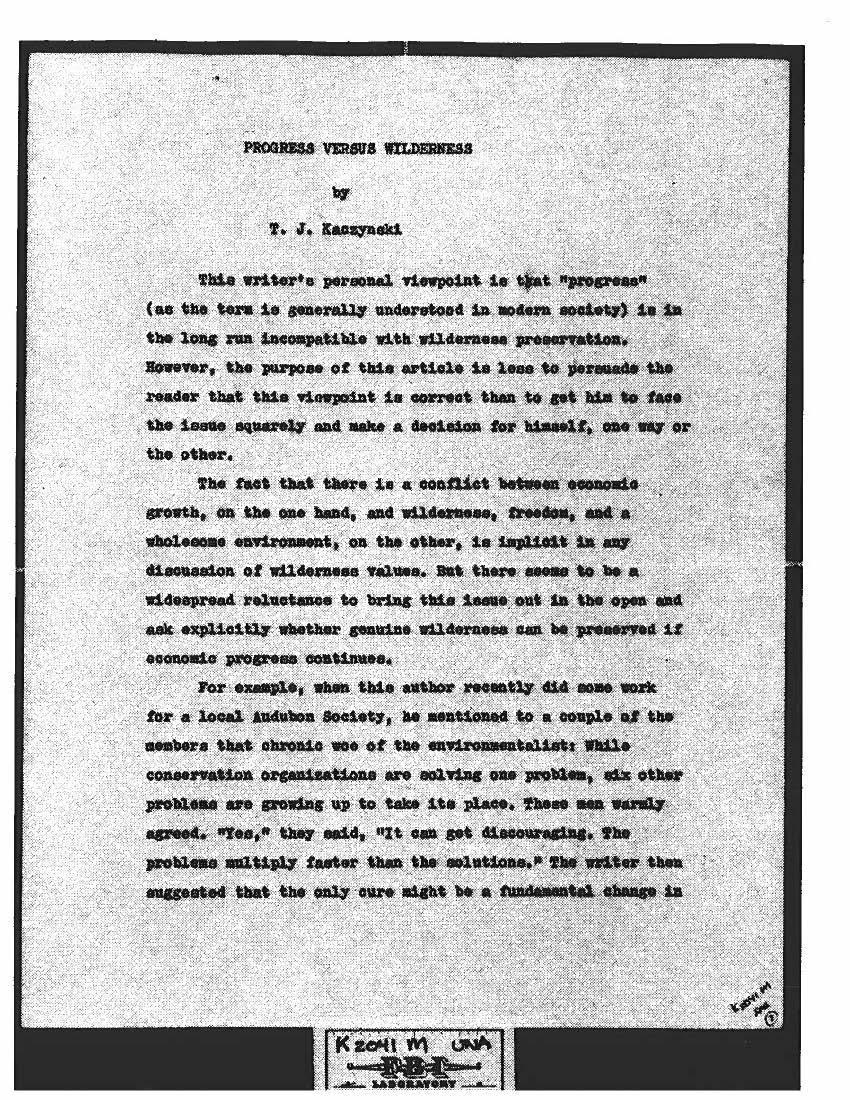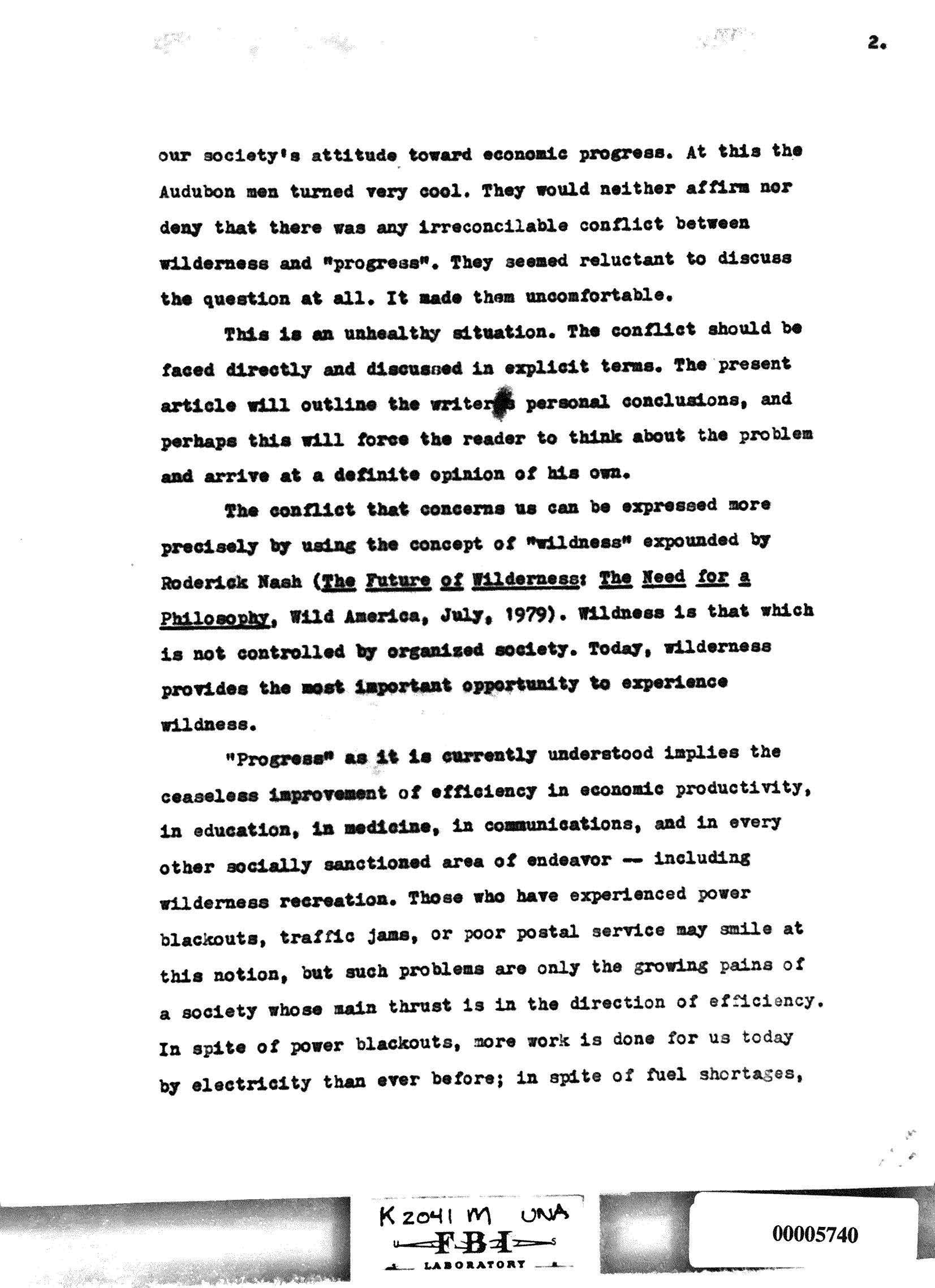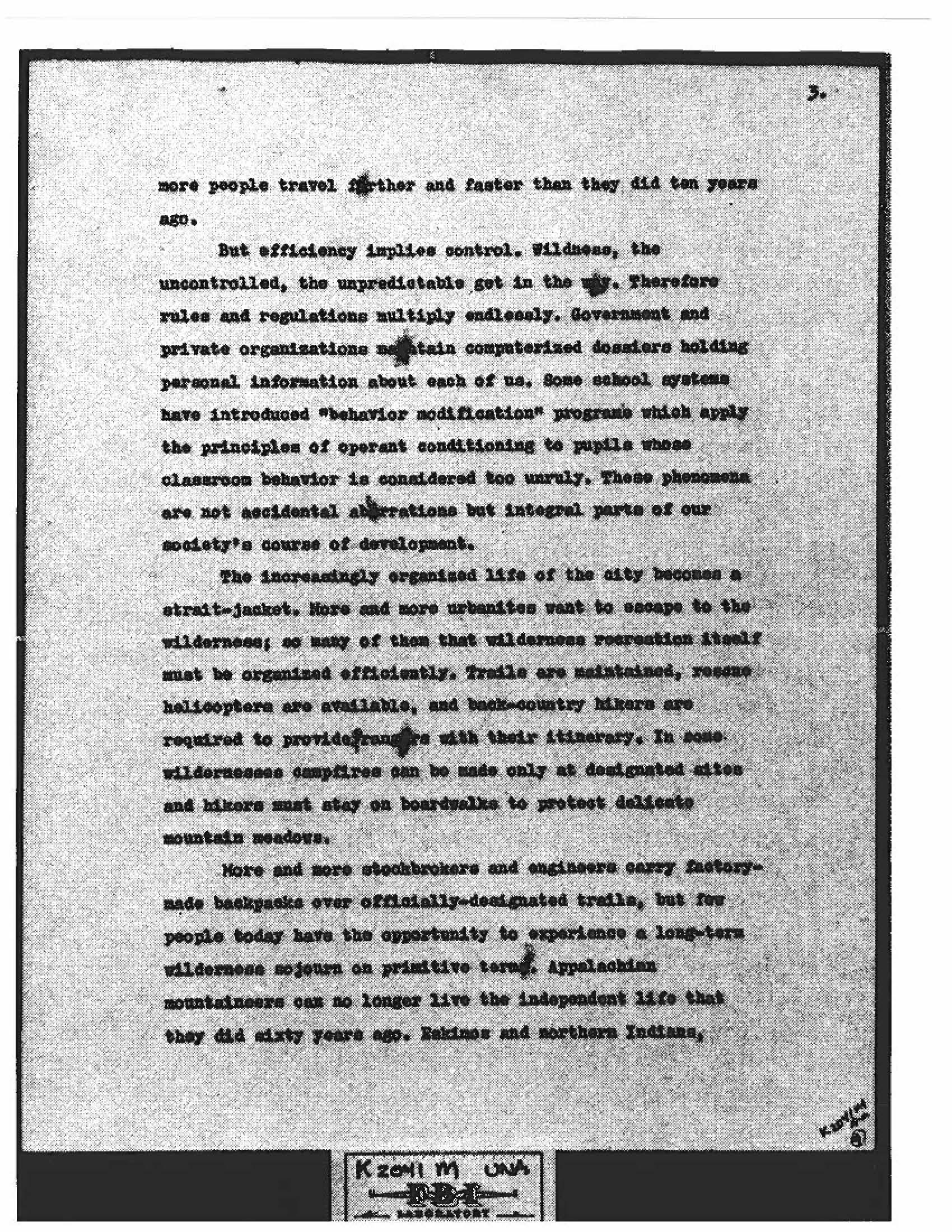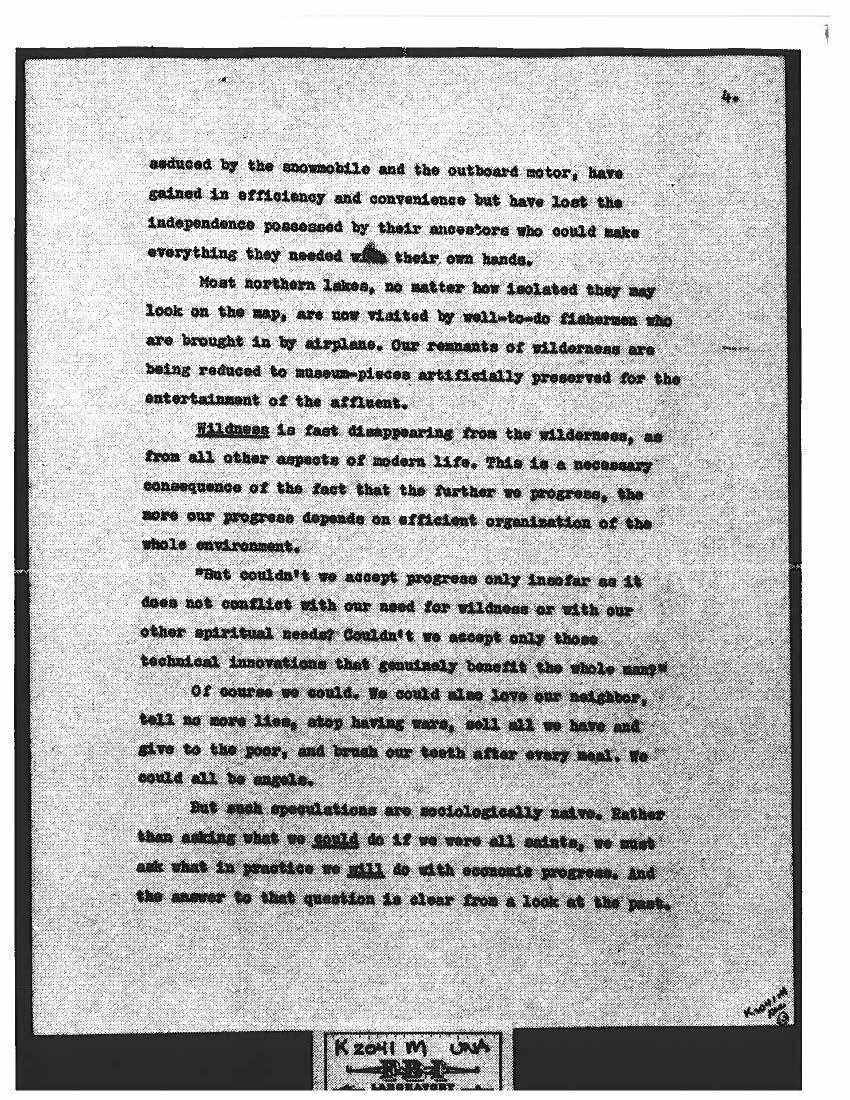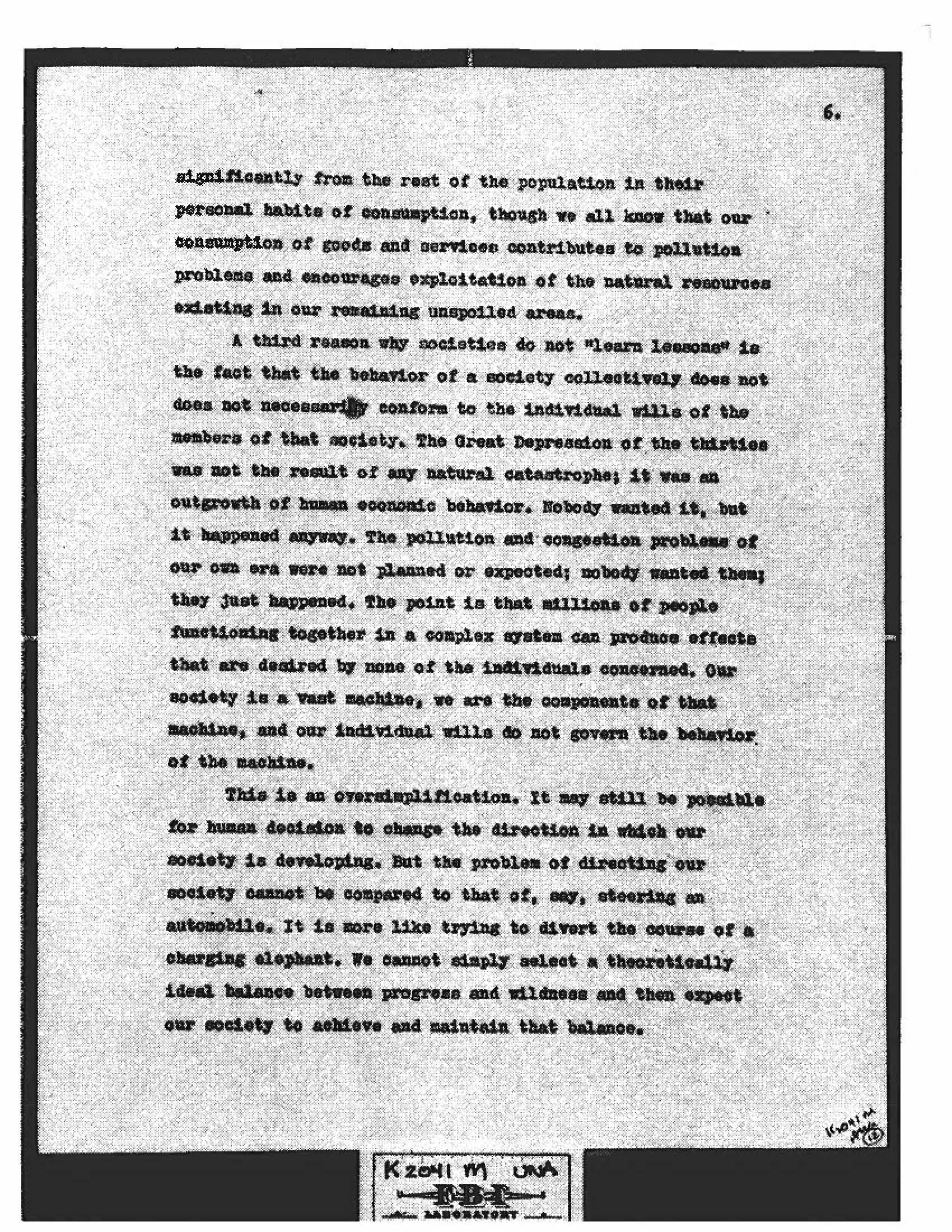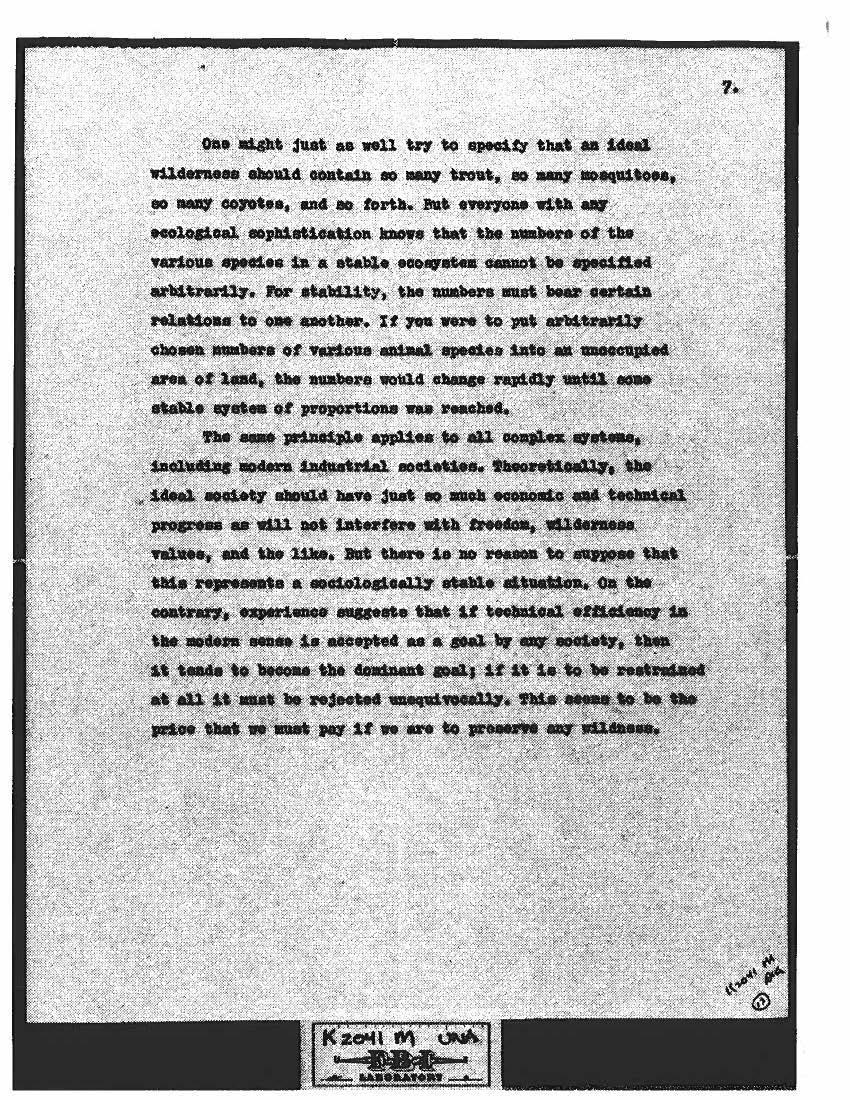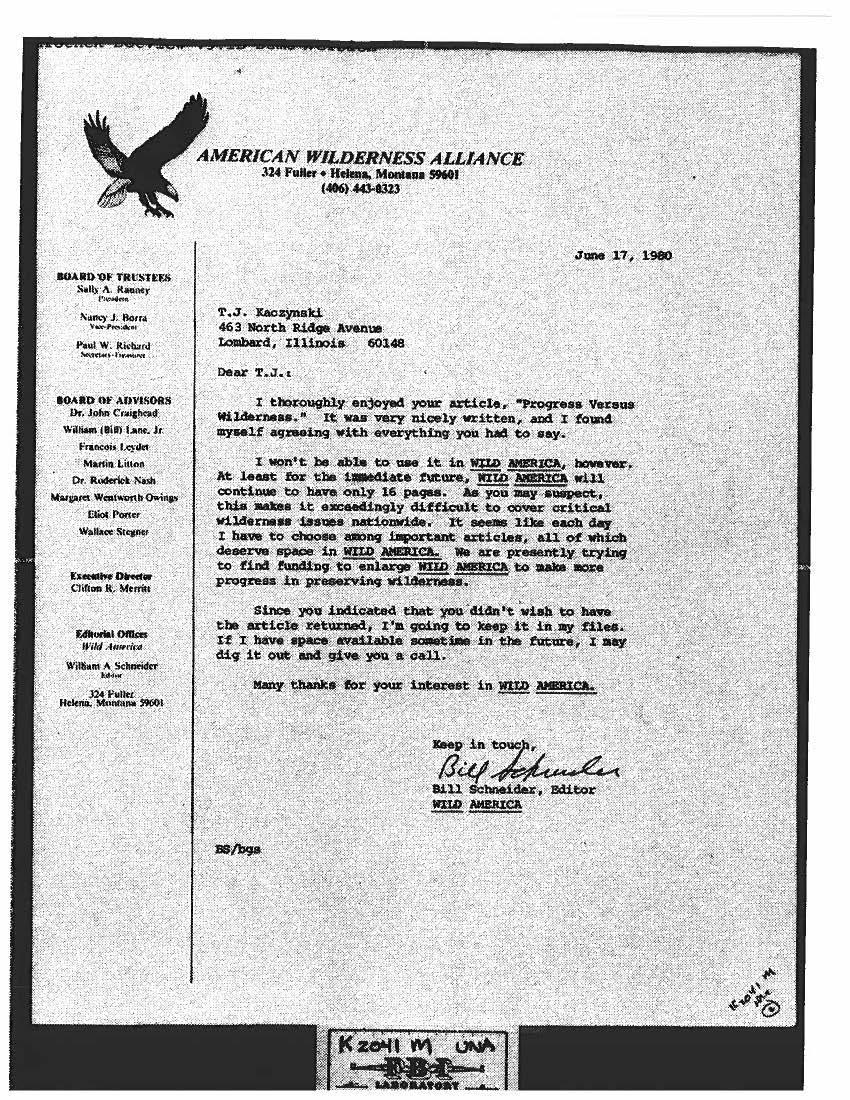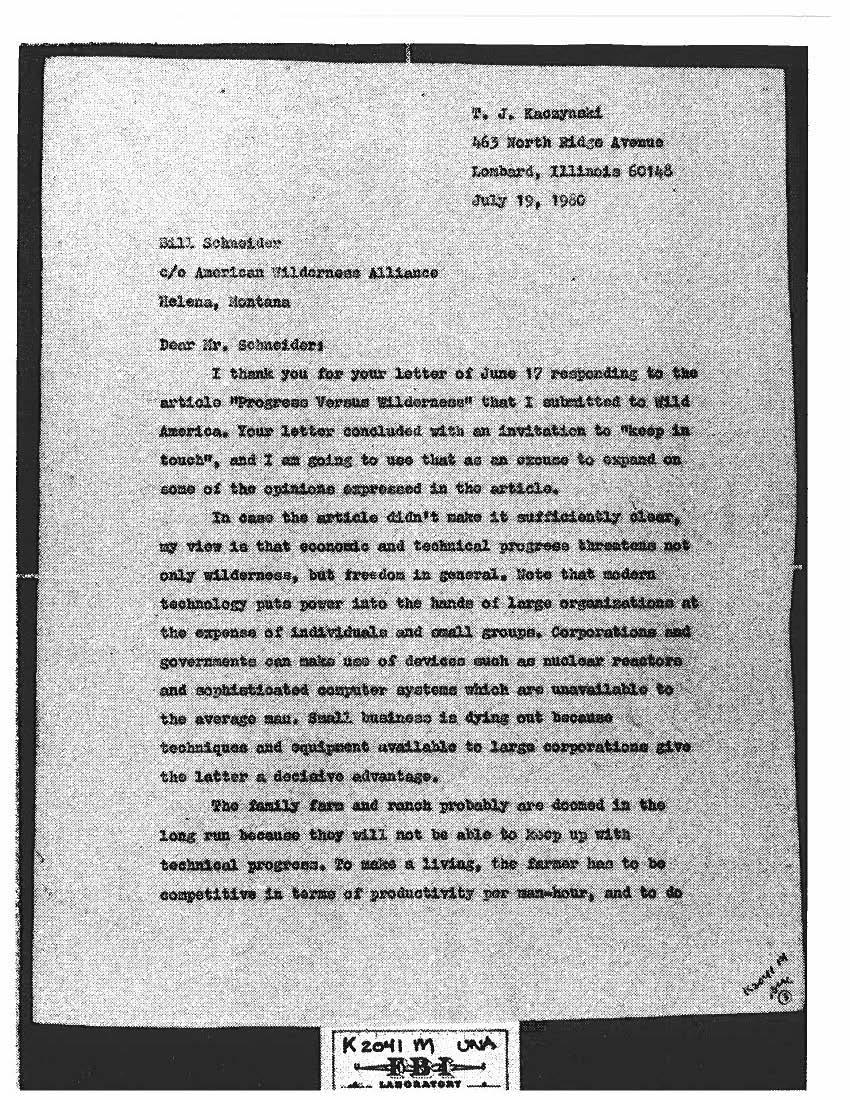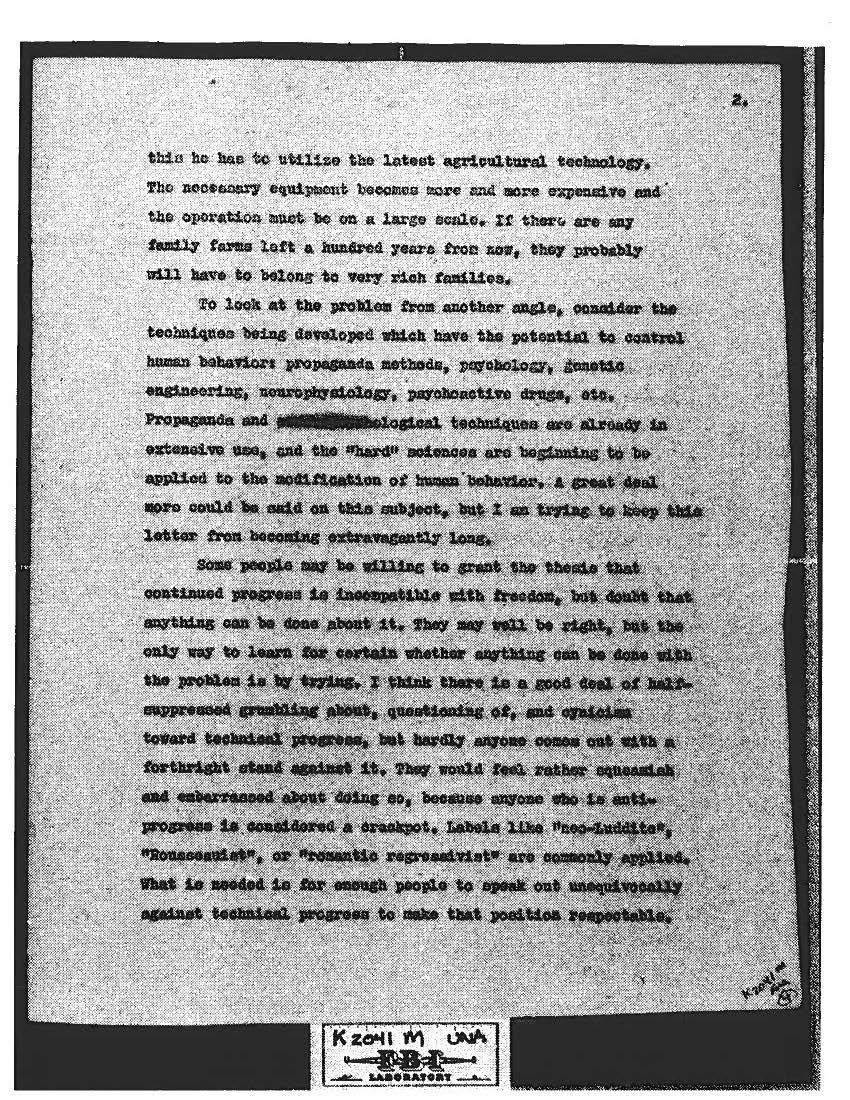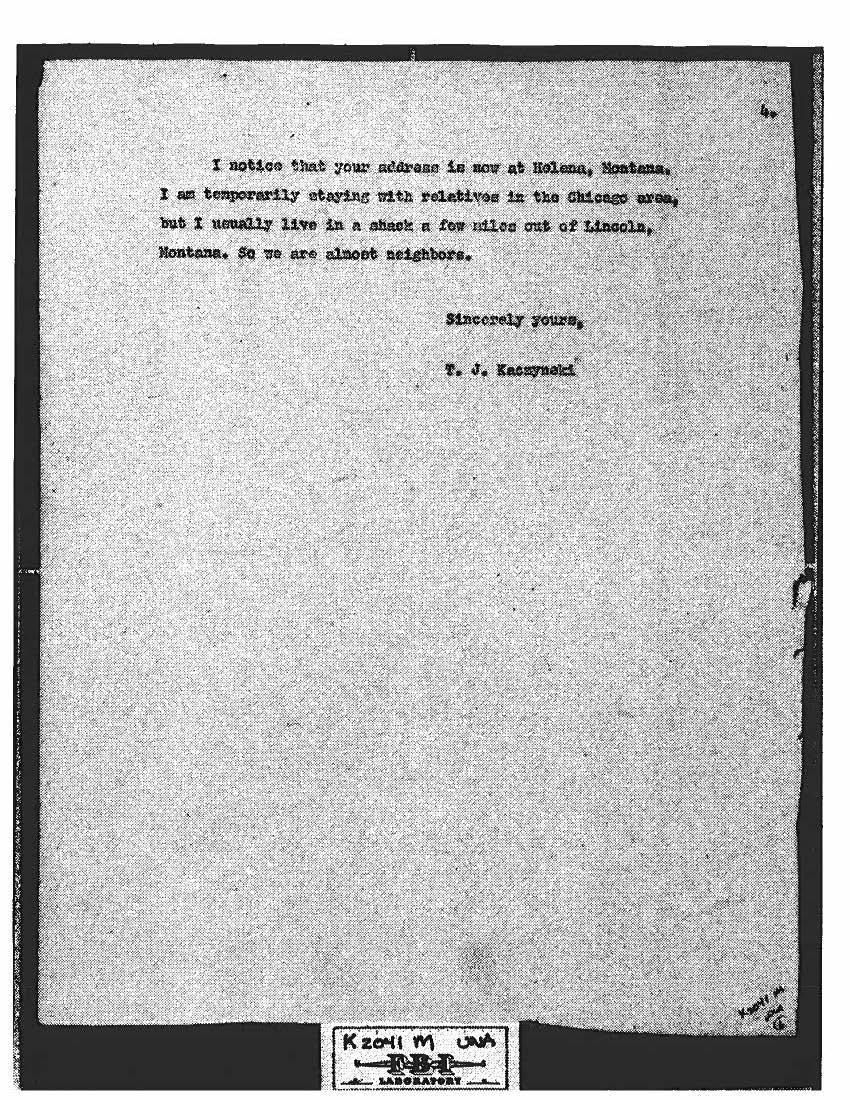Ted Kaczynski & Bill Schneider
Ted Kaczynski's Correspondence with 'Wild America' Journal
Progress versus Wilderness
by
T. J. Kaczynski
This writer's personal viewpoint is that "progress" (as the term is generally understood in modern society) is in the long run incompatible with wilderness preservation. However, the purpose of this article is less to persuade the reader that this viewpoint is correct than to get him to face the issue squarely and make a decision for himself, one way or the other.
The fact that there is a conflict between economic growth, on the one hand, and wilderness, freedom, and a wholesome environment, on the other, is implicit in any discussion of wilderness values. But there seems to be a widespread reluctance to bring this issue out in the open and ask explicitly whether genuine wilderness can be preserved if economic progress continues.
For example, when this author recently did some work for a local Audubon Society, he mentioned to a couple of the members that chronic woe of the environmentalist: While conservation organizations are solving one problem, six other problems are growing up to take its place. These men warmly agreed. "Yes," they said, "It can get discouraging. The problems multiply faster than the solutions." The writer then suggested that the only cure might be a fundamental change in our society's attitude toward economic progress. At this the Audubon men turned very cool. They would neither affirm nor deny that there was an irreconcilable conflict between wilderness and "progress". They seemed reluctant to discuss the question at all. It made them uncomfortable.
This is an unhealthy situation. The conflict should be faced directly and discussed in explicit terms. The present article will outline the writer's personal conclusions, and perhaps this will force the reader to think about the problem and arrive at a definite opinion of his own.
The conflict that concerns us can be expressed more precisely using the concept of “wildness” expounded by Roderick Nash (“The Future of Wilderness: The Need for a Philosophy”, Wild America, July 1979). Wildness is that which is not controlled by organized society. Today, wilderness provides the most important opportunity to experience wildness.
"Progress," as it is currently understood implies the ceaseless improvement of efficiency in economic productivity, in education, in medicine, in communications, and in every other socially sanctioned area of endeavor — including wilderness recreation. Those who have experienced power blackouts, traffic jams, or poor postal service may smile at this notion, but such problems are only the growing pains of a society whose main thrust is in the direction of efficiency. In spite of power blackouts, more work is done for us today by electricity than ever before; in spite of fuel shortages, more people travel further and faster than they did ten years ago.
But efficiency implies control. Wildness, the uncontrolled, the unpredictable get in the way. Therefore rules and regulations multiply endlessly. Government and private organizations maintain computerized dossiers holding personal information about each of us. Some school systems have introduced "behavior modification" programs which apply the principles of operant conditioning to pupils whose classroom behavior is considered too unruly. These phenomena are not accidental aberrations but integral parts of our society's course of development.
The increasingly organized life of the city becomes a strait-jacket. More and more urbanites want to escape to the wilderness; so many of them that wilderness recreation itself must be organized efficiently. Trails are maintained, rescue helicopters are available, and back-country hikers are required to provide rangers with their itinerary. In some wildernesses campfires can be made only at designated sites and hikers must stay on boardwalks to protect delicate mountain meadows.
More and more stockbrokers and engineers carry factory-made backpacks over officially-designated trails, but few people today have the opportunity to experience a long-term wilderness sojourn on primitive terms. Appalachian mountaineers can no longer live the independent life that they did sixty years ago. Eskimos and northern Indians, seduced by the snowmobile and the outboard motor, have gained in efficiency and convenience but have lost the independence possessed by their ancestors who could make everything they needed with their own hands.
Most northern lakes, no matter how isolated they may look on a map, are now visited by well-to-do fishermen who are brought in by airplane. Our remnants of wilderness are being reduced to museum-pieces artificially preserved for the entertainment of the affluent.
Wildness is fast and disappearing from the wilderness, as from all other aspects of modern life. This is a necessary consequence of the fact that the further we progress, the more our progress depends on efficient organization of the whole environment.
"But couldn't we accept progress only insofar as it does not conflict with our need for wildness or with our other spiritual needs? Couldn't we accept only those technical innovations that genuinely benefit the whole [of] man?"
Of course we could. We could also love our neighbor, tell no more lies, stop having wars, sell all we have and give to the poor, and brush our teeth after every meal. We could all be angels.
But such speculations are sociologically naive. Rather than asking what we could do if we were all saints, we must ask what in practice we will do with economic progress. And the answer to that question is clear from a look at the past.
"But we've learned lessons from the past, haven't we?" Yes, Lessons of a strictly technical character. We've learned that logging must be regulated if we don't want to run out of timber. We've learned that we have to stop spraying DDT indiscriminately if we don't want to poison ourselves. In other words, we've learned that some of our past practices have been technically inefficient. But we haven't learned to restrain the impulse toward technical efficiency and material wealth in cases where there's conflict with other values.
History shows that societies simply do not learn lessons of that kind - even though many individuals within a society may learn them. Therefore at least three reasons for this. One is that the egos of politicians, industrialists, and other members of the controlling elite are gratified by the grandiose. Every mayor, governor, or president prefers to be at the head of a dynamically expanding system, and likes to boast that the economy of his city, state, or nation grew by so-and-so many percentage points during his administration. Men's spiritual needs. and even to some extent their physical health needs, are inconvenient obstacles and so are rationalized away.
A second reason is that even if all individuals within a society became convinced of the importance of wildness, wilderness, and a wholesome environment, it wouldn't necessarily change their behavior. It has been this writer's observation that most conservationists do not differ significantly from the rest of the population in their personal habits of consumption, though we all know that our consumption of goods and services contributes to pollution problems and encourages exploitation of the natural resources existing in out remaining unspoiled areas.
A third reason why societies do not "learn lessons" is the fact that the behavior of a society collectively does not necessarily conform to the individual wills of the members of the society. The Great Depression of the thirties was not the result of any natural catastrophe; it was an outgrowth of human economic behavior. Nobody wanted it, but it happened anyway. The pollution and congestion problems of our era were not planned or expected; nobody wanted them; they just happened. The point is that millions of people functioning together in a complex system can produce effects that are desired by none of the individuals concerned. Our society is a vast machine, we are the components of the machine, and our individual wills do not govern the behavior of the machine.
This is an oversimplification. It may still be possible for human decision to change the direction in which our society is developing. But the problem of directing our society cannot be compared to that of, say, steering an automobile. It is more like trying to divert the course of a charging elephant. We cannot simply select a theoretically ideal balance between progress and wilderness and then expect our society to achieve and maintain that balance.
One might just as well try to specify that an ideal wilderness should contain so many trout, so many mosquitoes, so many coyotes, and so forth. But everyone with any ecological sophistication knows that the numbers of the various species in a stable ecosystem cannot be specified arbitrarily. For stability, the numbers must bear certain relations to one another. If you were to put arbitrarily chosen numbers of various animal species into an unoccupied area of land, the numbers would change rapidly until some stable system of proportions was reached.
The same principle applies to all complex systems, including modern industrial societies. Theoretically, the ideal society should have just so much economic and technical progress as will not interfere with freedom, wilderness values, and the like. But there is no reason to suppose that this represents a sociologically stable situation. On the contrary, experience suggests that if technical efficiency in the modern sense is accepted as a goal by ant society, then it tends to become the dominant goal; if it is to be restricted at all it must be rejected unequivocally. This seems to be the price that we must pay if we are to preserve any wildness.
A Reply from Wild America
June 17, 1980
Dear T.J.
I thoroughly enjoyed your article, “Progress Versus Wilderness.” It was very nicely written, and I found myself agreeing with everything you had to say.
I won't be able to use it in WILD AMERICA, however. At least for the immediate future, WILD AMERICA will continue to have only 16 pages. As you may suspect, this makes it exceedingly difficult to cover critical wilderness issues nationwide. It seems like each day I have to choose among important articles, all of which deserve space in WILD AMERICA. We are presently trying to find funding to enlarge WILD AMERICA to make more progress in preserving wilderness.
Since you indicated that you didn't wish to have the article returned, I'm going to keep it in my files. If I have space available sometime in the future, I may dig it out and give you a call.
Many thanks for your interest in WILD AMERICA
Keep in touch,
[signed Bill Schneider],
Editor WILD AMERICA
A Reply to the Reply
June 19, 1980
Dear Mr. Schneider:
I thank you for your letter of June 17 responding to the article "Progress Versus Wilderness" that I submitted to Wild America. Your letter concluded with an invitation to "keep in touch, and I am going to use that as an excuse to expand on some of the opinions expressed in the article.
In case the article didn't make it sufficiently clear, my view is that economic and technical progress threatens not only wilderness, but freedom in general. Note that modern technology puts power into the hands of large organizations at the expense of individuals and small groups. Corporations and governments can make use of devices such as nuclear reactors and sophisticated computer systems which are unavailable to the average man. Small business is dying out because techniques and equipment available to large corporations give the latter a decisive advantage.
The family farm and ranch probably are doomed in the long run because they will not be able to keep up with technical progress. To make a living, the farmer has to be competitive in terms of productivity per man-hour, and to do this he has to utilize the latest agricultural technology. The necessary equipment becomes more and more expensive and the operation must be on a large scale. If there are any family farms left a hundred years from now, they probably wi;; have to belong to very rich families.
To look at the problem from another angle, consider the techniques being developed which have the potential to control human behavior: propaganda methods, psychology, genetic engineering, neurophysiology, psychoactive drugs, etc. Propaganda and [blank] psychological techniques are already in extensive use, and the "hard" sciences are beginning to be applied to the modification of human behavior. A great deal more could be said on this subject, but I am trying to keep this letter from becoming extravagantly long.
Some people may be willing to grant the thesis that continued progress is incompatible with freedom, but doubt that anything can be done about it, They may well be right, but the only way to learn for certain whether anything can be done with the problem is by trying. I think there is a good deal of half-suppressed grumbling about, questioning of, and cynicism toward technical progress, but hardly anyone comes out with a forthright stand against it. They would feel rather squeamish and embarrassed about doing so, because anyone who is anti-progress is considered a crackpot. Labels like "neo-Luddite", "Rousseauist", or "romantic regressivist" are commonly applied. What is needed is for enough people to speak out unequivocally against technical progress to make that position respectable.
Some sort of organized movement should be formed which should develop an anti-technological, pro-nature ideology and wait for the right political and psychological moment to expand its influence. Modern society currently seems to be in a state of sociological uncertainty and disorganization. It is quite possible that at some point some group will “save” the mass of mankind by presenting them with an ideology in which they can Believe (with a capital B), thereby [blank] problems. Unfortunately, it is all too likely that this group would succumb to the lure of power and carry the process of technological development to its logical conclusion - namely, total control. It would be better if an anti-technological movement were prepared to make its bid to play the savior and fill the ideological vacuum if and when the right moment comes.
Of course, the remarks in the foregoing paragraph are speculative. I don't claim to know how the idea could be put into effect. But this much does seem clear: Those who work for wilderness preservation as a means to human freedom are bound to lose in the long run, because their efforts to not strike at the root of the problem, which is progress itself. Therefore, they should begin pushing the idea that economic and technical progress is bad and that it ought to be opposed.
I am fully aware that the problems involved in stopping progress would be enormous; often they soon well-nigh insuperable. but it appears to me that if the attempt is not made then the human race will eventually be reduced to a collection of virtual robots.
I notice that your address is now at Helena, Montana. I am temporarily staying with relatives in the Chicago area, but I usually live in a shack a few miles out of Lincoln, Montana. So we are almost neighbors.
Sincerely yours,
T. J. Kaczynski
